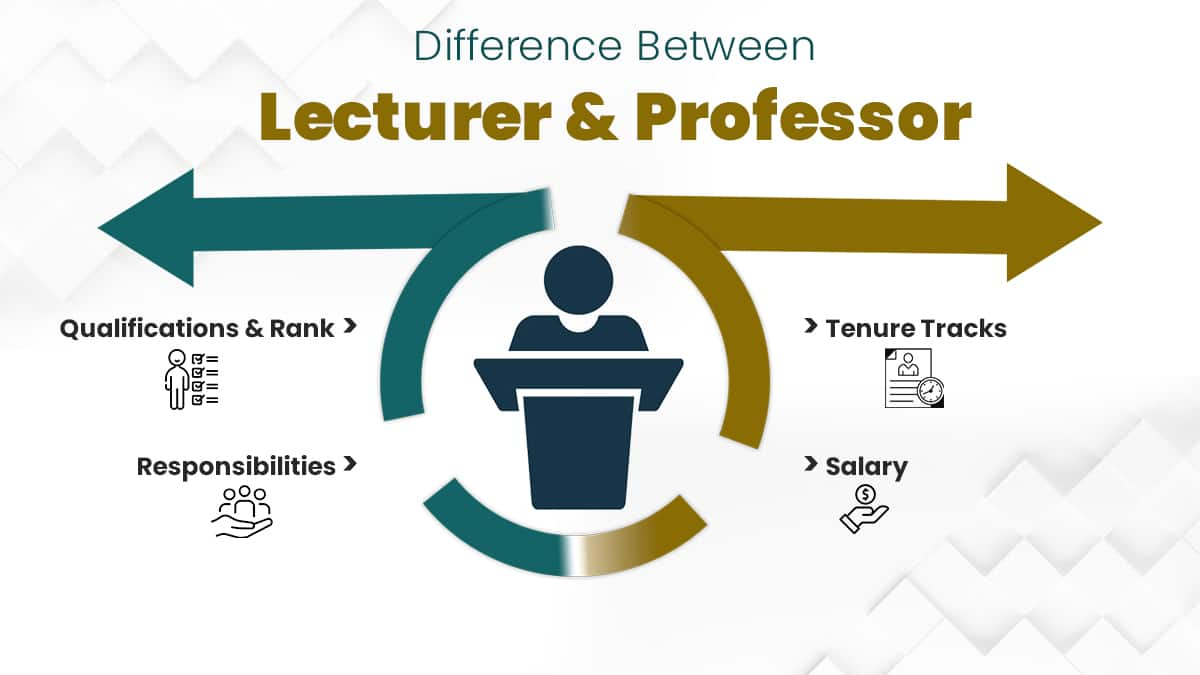Difference Between Lecturer And Professor: Qualifications, Responsibilities, Salary
Who is a lecturer? Who is a professor? These terms are often used interchangeably. But have you ever wondered if there's any difference? While both of these professions are significant in academia, there are evident differences between them. In this article, we explore the difference between a lecturer and professor in terms of their responsibilities, educational qualifications and work environment. Let’s begin!

Who Is A Lecturer?
A lecturer is an early academic who teaches at colleges and universities. They usually teach undergraduate students, and their duties include fewer research obligations. They are often employed on a contract tenure basis and their work mainly comprises teaching, conducting seminars and scheduling classes. Understanding the role of a lecturer is the first step towards exploring the difference between a lecturer and a professor in college.
If you are wondering how to become a lecturer, you typically need to complete a postgraduate degree, including a master’s, competitive exams like UGC NET/SET and receive relevant teaching experience. For those candidates ambitious about building a long-term career in academia, understanding how to become a Teacher at a school or higher education institution can be a good starting point before becoming a lecturer or professor.
Key Skills:
Excellent communication skills
Written skills
Critical thinking
Lesson planning
Who Is A Professor?
A professor is a senior academic who teaches in colleges and universities, for both undergraduate and postgraduate students. They are actively involved in research, mentoring PG students and Phd scholars for their research work. A professor usually has higher education qualifications than a lecturer and is often hired on a tenure basis. They are offered a permanent position upon meeting UGC guidelines, that is, a PhD with several research publications, and a minimum of years of teaching experience. This distinction highlights the difference between a lecturer and professor in India in terms of academic qualifications, research experience and career prospects.
Key Skills:
Oral and written skills
Subject matter expertise
Research and mentoring
Pedagogy skills
Curriculum development
What Is The Difference Between Lecturer And Professor?
Even though the roles and responsibilities of a lecturer and professor overlap sometimes, there are obvious differences between these two. Understanding a Teacher Job Description & Roles and Responsibilities can help you get clarity on what is expected from lecturers and professors in terms of teaching, student evaluation and academic mentoring.
Differences | Lecturer | Professor |
Qualifications and Rank | A lecturer must be a master's degree holder with a minimum of 50 per cent marks and qualify for NET (National Eligibility Exam) or SET (State Eligibility Exam). Lecturers are at an entry-level position in their academic career. Most of them pursue higher education, such as a PhD, later to enhance their career growth | A professor has 8-10 years of experience and a PhD. They also engage in researching and publishing their content in UGC approved journals along with teaching. The research is conducted to advance expertise in their subject area and to upgrade their qualifications. |
Responsibilities | A lecturer’s duty primarily revolves around classroom instructions. They teach, assess students' performance and provide feedback. The course materials are developed and effectively delivered to students by lecturers. | A professor primarily deals with teaching students and also engages in research and administrative duties. They are involved in important decision-making related to the department and also act as the educational counsellor for students. |
Tenure Tracks | A lecturer is also known as an assistant professor and is employed with a contract initially. The contract can range from one to two years, depending on the institution. They will be assessed for their performance to be considered for a permanent position later. | Professors are appointed with a tenure or full-time permanent position after years of experience as an assistant professor. They hold a higher academic rank than a lecturer due to their extensive years of teaching experience and research contributions. |
Salary | The average annual salary of a lecturer in India is Rs. 1.1 Lakh - 9.5 Lakhs with 1 to 11 years of experience. With positions in colleges and universities, a lecturer earns around Rs 21,000 - 23,000 monthly. | A professor with 3 to 15 years of experience can earn an annual average salary of Rs 3.3 Lakhs - 36 Lakhs. Their monthly salary can range from Rs 85,000 to Rs 88,000. |
(Salary Source: Ambitionbox)
Conclusion
Lecturers and professors are the most pursued and traditionally desired professions with high job security and satisfaction. Both roles are important aspects of our educational institutions, but when it comes to the difference between a lecturer and professor salary, a career as a professor is highly rewarding with comparatively higher remuneration and ranking. It is up to you to choose the right career path by ensuring that you select the profession that best reflects your interests. For those aspiring for teacher careers more broadly, resources on How to Become a High School Teacher can guide you with useful knowledge.
